13 Best Herbal Teas For Baldness
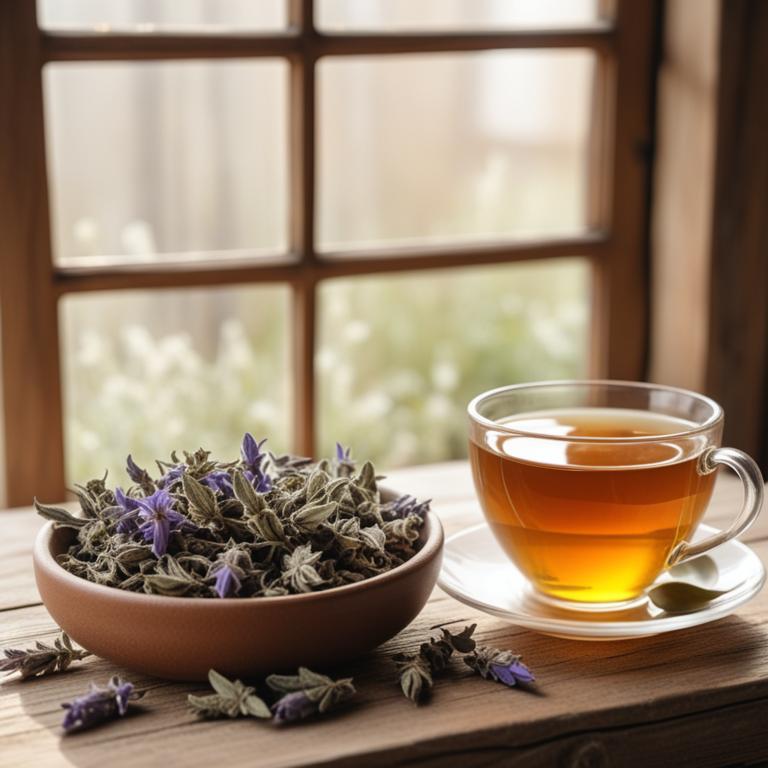
Herbal teas for baldness are a type of natural remedy that utilizes plant extracts to promote hair growth, slow down hair loss, and improve scalp health.
These teas offer numerous benefits, including reducing stress, balancing hormones, and increasing blood circulation to the scalp, which can help to prevent baldness.
Certain herbal teas, such as saw palmetto, rosemary, and sage, have been shown to block the production of dihydrotestosterone (DHT), a hormone that contributes to hair loss.
Other herbal teas, like ginseng, peppermint, and ginger, can help to stimulate hair growth and improve overall scalp health, while teas like nettle leaf, burdock root, and lavender can help to soothe and calm the scalp.
According to "International journal of molecular sciences", teas for baldness such as Camellia sinensis (black tea) have been studied for their potential to reduce the rate of hair loss or stimulate new hair growth due to the presence of flavonoids.
Below there's a list of the 13 best herbal teas for baldness.
- 1. Rosmarinus officinalis teas
- 2. Serenoa repens teas
- 3. Urtica dioica teas
- 4. Avena sativa teas
- 5. Lavandula angustifolia teas
- 6. Ginkgo biloba teas
- 7. Foeniculum vulgare teas
- 8. Melissa officinalis teas
- 9. Rheum palmatum teas
- 10. Cynara scolymus teas
- 11. Citrullus lanatus teas
- 12. Triticum aestivum teas
- 13. Equisetum arvense teas
Also you may be interested in...
TODAY'S FREE BOUNDLE
Herb Drying Checklist + Herbal Tea Shopping List + Medicinal Herbs Flashcards
Enter you best email address below to receive this bundle (3 product valued $19.95) for FREE + exclusive access to The Aphotecary Letter.
$19.95 -> $0.00
1. Rosmarinus officinalis teas

Rosmarinus officinalis teas have been traditionally used to help treat baldness, a common condition characterized by hair loss.
The properties of this herbal preparation, including its antioxidant and anti-inflammatory properties, help to promote hair growth and improve scalp health by reducing oxidative stress and inflammation.
Bioactive constituents such as rosmarinic acid, camphor, and borneol in Rosmarinus officinalis teas have been found to stimulate hair growth, improve blood circulation to the scalp, and reduce hair follicle miniaturization.
The benefits of using Rosmarinus officinalis teas to treat baldness include promoting hair regrowth, strengthening hair follicles, and improving overall scalp health, making it a potential natural remedy for this condition.
2. Serenoa repens teas
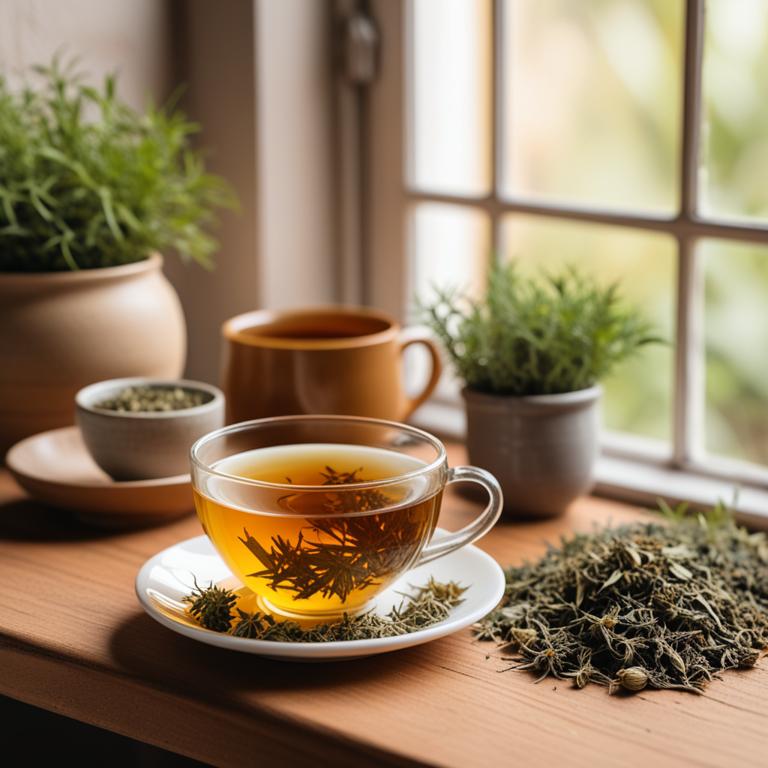
Serenoa repens teas, also known as saw palmetto teas, have been traditionally used to treat androgenetic alopecia, a common form of baldness caused by hormonal imbalances.
The properties of this herbal preparation help to treat this ailment by inhibiting the conversion of testosterone to dihydrotestosterone (DHT), a hormone that contributes to hair loss.
The bioactive constituents of Serenoa repens, including fatty acids, sterols, and phenolic compounds, have been shown to exhibit anti-androgenic and antioxidant properties, which help to promote hair growth and prevent further hair loss.
The benefits of using Serenoa repens teas to treat androgenetic alopecia include improved hair density, reduced hair shedding, and a decrease in the risk of hair loss.
Related Study
According to "Current pharmaceutical design", Serenoa repens teas for baldness may be effective in reducing hair loss directly or indirectly due to its anti-inflammatory and antioxidant properties.
3. Urtica dioica teas

Urtica dioica teas, also known as nettle root tea, have been traditionally used to treat the baldness ailment known as alopecia.
The properties of this herbal preparation that help to treat this ailment include its anti-inflammatory and antioxidant properties, which help to reduce stress and promote hair growth.
Bioactive constituents of this herbal preparation, such as flavonoids and lignans, help to block the conversion of testosterone to dihydrotestosterone (DHT), a hormone that contributes to hair loss.
By reducing DHT levels and promoting hair growth, Urtica dioica teas may help to stimulate hair follicles, promote hair re-growth, and reduce the risk of baldness.
Related Study
According to the study, Urtica dioica teas for baldness show potential in reducing hair loss due to their anti-inflammatory and antioxidant properties and ability to improve local metabolism when applied externally.
4. Avena sativa teas

Avena sativa teas, also known as oat straw teas, have been used for centuries to treat hair loss and promote hair growth.
This herbal preparation contains a range of bioactive constituents, including avenanthramides, flavonoids, and phenolic acids, which help to promote hair growth by stimulating blood flow to the scalp and reducing inflammation.
The properties of Avena sativa teas that help to treat baldness include its anti-inflammatory and antioxidant effects, which help to protect the scalp from damage and promote a healthy environment for hair growth.
Drinking Avena sativa teas regularly has been shown to improve hair density and reduce shedding, making it a popular natural remedy for treating baldness and promoting overall hair health.
Related Study
According to the Journal of Ethnopharmacology, Avena sativa teas for baldness may be beneficial in treating baldness as it contains phytochemicals such as phenols, isoflavones, and triterpenes that have been shown to inhibit 5α-reductase, an enzyme involved in the formation of dihydrotestosterone, a primary contributor to androgenetic alopecia (AGA).
5. Lavandula angustifolia teas

Lavandula angustifolia teas have been traditionally used to treat baldness, also known as alopecia, due to their ability to promote hair growth and improve scalp health.
The properties of this herbal preparation help to reduce stress and anxiety, which are common triggers for hair loss, and its antioxidant and anti-inflammatory properties help to soothe and calm the scalp.
The bioactive constituents of Lavandula angustifolia, including linalool and linalyl acetate, help to stimulate hair growth by increasing blood flow and reducing inflammation in the scalp.
Regular consumption of Lavandula angustifolia teas has been shown to promote hair growth, reduce hair loss, and improve overall scalp health, making it a potential natural remedy for treating baldness.
6. Ginkgo biloba teas

Ginkgo biloba teas have been studied for their potential in treating alopecia, a common form of baldness.
The antioxidant and anti-inflammatory properties of this herbal preparation help to reduce oxidative stress and inflammation in the scalp, which can contribute to hair loss.
Bioactive constituents such as flavonoids and terpenoids, particularly bilobalide and ginkgolide, have been shown to promote hair growth by improving blood circulation and reducing the formation of dihydrotestosterone, a hormone that contributes to hair loss.
Regular consumption of Ginkgo biloba teas may help to promote hair growth, improve scalp health, and reduce the risk of hair loss, making it a potential natural remedy for alopecia.
7. Foeniculum vulgare teas

Foeniculum vulgare teas have been traditionally used to treat alopecia or baldness due to their potent properties that promote hair growth and prevent hair loss.
The tea's ability to stimulate blood circulation to the scalp, reduce stress, and inhibit the conversion of testosterone to dihydrotestosterone (DHT) contribute to its therapeutic effects.
The bioactive constituents of Foeniculum vulgare, including essential oils and flavonoids, have been shown to have anti-inflammatory and antioxidant properties that help to protect the hair follicles and promote hair regrowth.
Regular consumption of Foeniculum vulgare teas has been found to be beneficial in treating baldness by promoting a healthy scalp environment, reducing hair fall, and promoting new hair growth.
8. Melissa officinalis teas

Melissa officinalis teas have been used to treat alopecia or baldness due to their properties as a natural stimulant, antioxidant, and anti-inflammatory agent.
The herbal preparation helps to treat this ailment by promoting hair growth, reducing stress and anxiety that can contribute to hair loss, and improving overall scalp health.
The bioactive constituents of Melissa officinalis teas, including citral, geraniol, and linalool, have been shown to have anti-androgenic and anti-inflammatory effects, which can help to promote hair growth and reduce hair loss.
The benefits of using Melissa officinalis teas to treat baldness include promoting hair regrowth, reducing the risk of further hair loss, and providing a natural and non-invasive treatment option for this condition.
9. Rheum palmatum teas
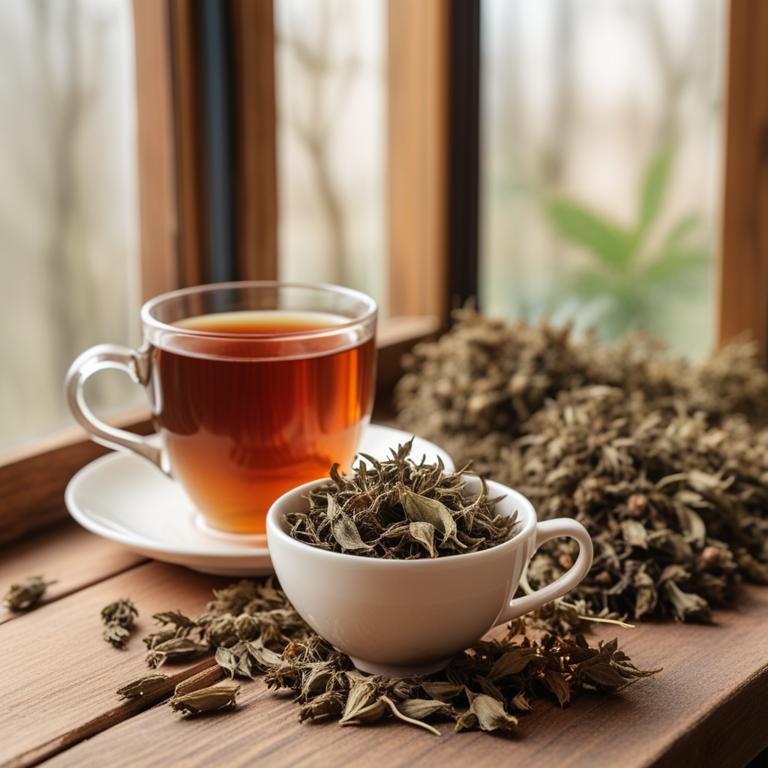
Rheum palmatum teas, also known as Tibetan rhubarb tea, have been used in traditional Chinese medicine to treat baldness, particularly androgenetic alopecia, due to its anti-inflammatory and antioxidant properties.
The bioactive constituents of Rheum palmatum, such as anthraquinones and glycosides, help to promote hair growth by reducing inflammation and oxidative stress in the scalp, which are known to contribute to hair loss.
By consuming Rheum palmatum teas, individuals can potentially stimulate hair follicle growth and improve hair density, leading to a more robust and healthy-looking scalp.
The benefits of using Rheum palmatum teas for treating baldness include its natural and non-invasive approach, minimal side effects, and potential long-term results, making it a promising herbal remedy for individuals seeking a holistic approach to addressing hair loss.
10. Cynara scolymus teas
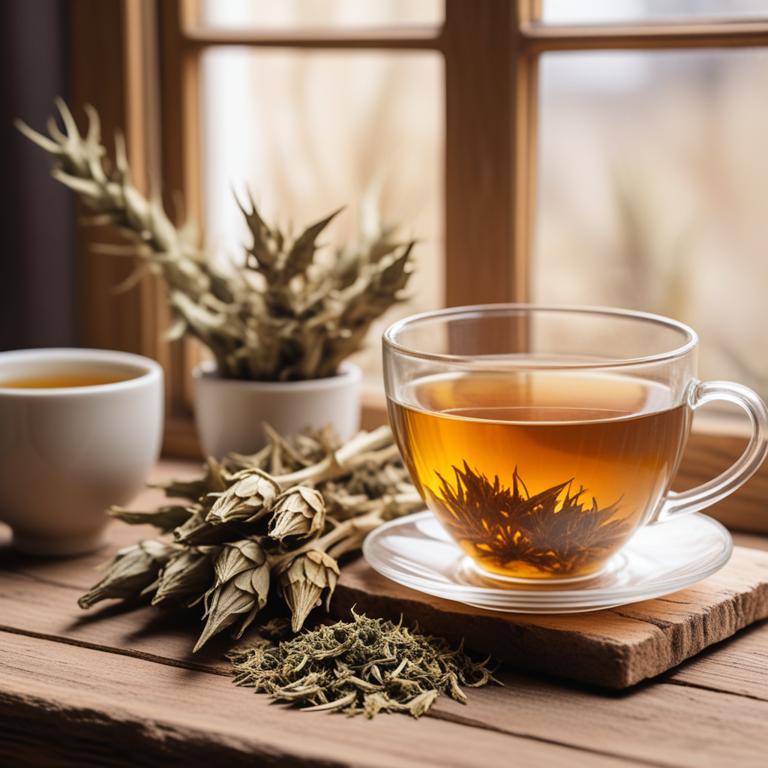
Cynara scolymus teas, derived from the artichoke plant, have been traditionally used to treat androgenetic alopecia, a common form of baldness.
The properties of this herbal preparation that help to treat baldness include anti-inflammatory, antioxidant, and cytoprotective effects, which promote hair growth and reduce hair loss.
The bioactive constituents of Cynara scolymus teas, such as cynarin and silymarin, have been found to inhibit 5-alpha-reductase, an enzyme responsible for converting testosterone to dihydrotestosterone, a hormone linked to hair loss.
The benefits of using Cynara scolymus teas to treat baldness include promoting hair regrowth, reducing hair loss, and improving scalp health, making it a promising natural remedy for addressing androgenetic alopecia.
11. Citrullus lanatus teas
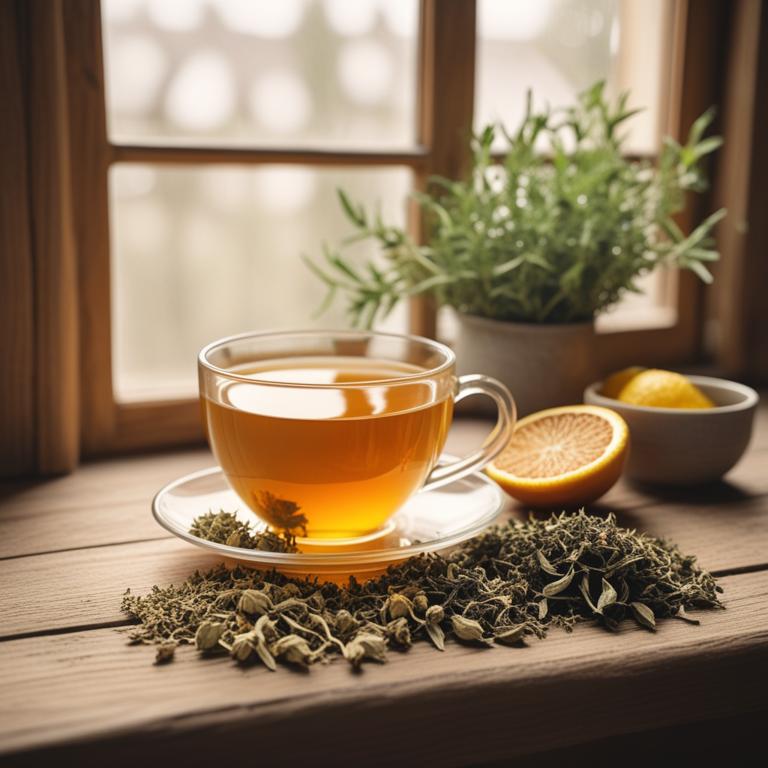
Citrullus lanatus teas, also known as watermelon tea, have been traditionally used to treat baldness or alopecia due to its potential properties in stimulating hair growth.
The bioactive constituents present in this herbal preparation, such as citrulline and lycopene, help to promote hair growth by increasing blood flow and reducing inflammation in the scalp.
This herbal preparation is believed to help treat baldness by promoting the growth of new hair follicles and strengthening the existing ones, thereby reducing hair loss and promoting a healthy scalp.
The benefits of Citrullus lanatus teas in treating baldness include its natural, non-invasive, and potentially cost-effective approach, making it an attractive alternative to conventional treatments for this condition.
12. Triticum aestivum teas

Triticum aestivum teas, derived from the wheat plant, have been traditionally used to treat baldness due to their potential to stimulate hair growth and improve scalp health.
The properties of this herbal preparation, including its antioxidant and anti-inflammatory effects, help to treat baldness by promoting a healthy scalp environment and reducing oxidative stress.
The bioactive constituents of Triticum aestivum teas, such as ferulic acid and avenanthramides, have been shown to have protective effects on hair follicles and promote hair growth.
The benefits of using Triticum aestivum teas to treat baldness include promoting hair growth, reducing inflammation, and improving scalp health, making it a potential natural remedy for this condition.
13. Equisetum arvense teas
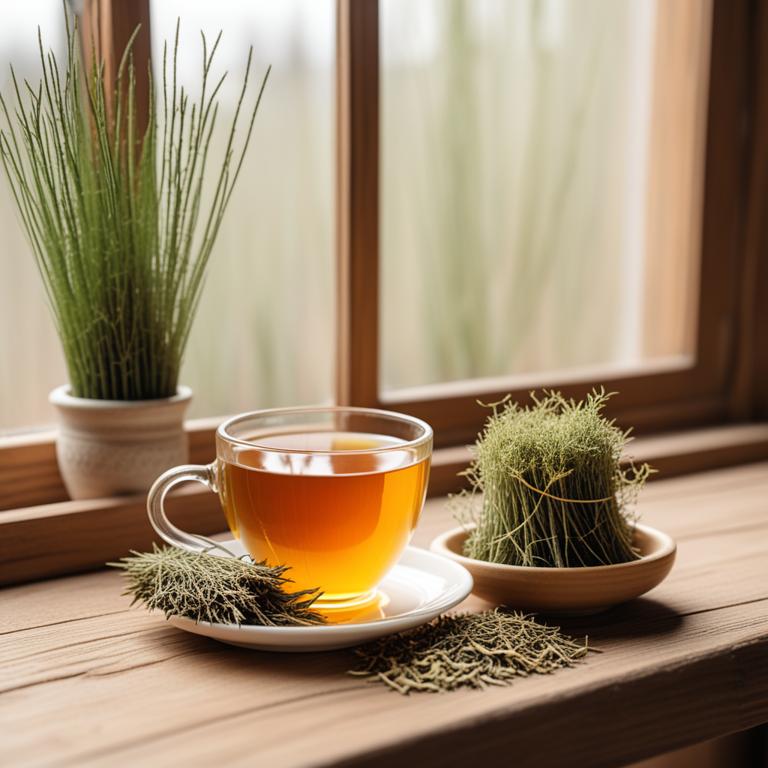
Equisetum arvense teas, also known as horsetail tea, have been traditionally used to treat alopecia or baldness due to its potential to promote hair growth and strengthen hair follicles.
This herbal preparation is believed to help treat baldness by reducing inflammation, improving blood circulation, and providing essential nutrients to the scalp.
The bioactive constituents of Equisetum arvense tea, including flavonoids, phenolic acids, and silica, are thought to contribute to its potential hair growth-promoting properties.
Regular consumption of Equisetum arvense tea may help to stimulate hair growth, improve hair texture, and reduce the risk of baldness.